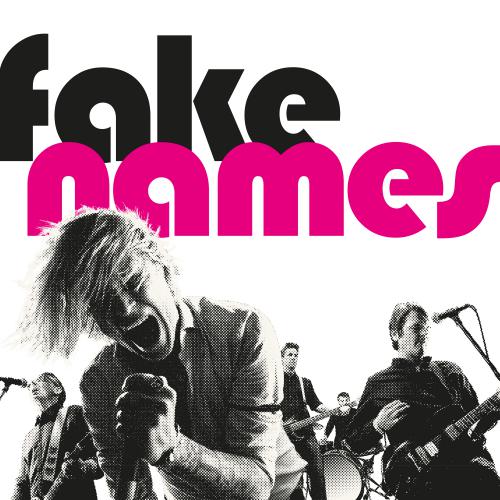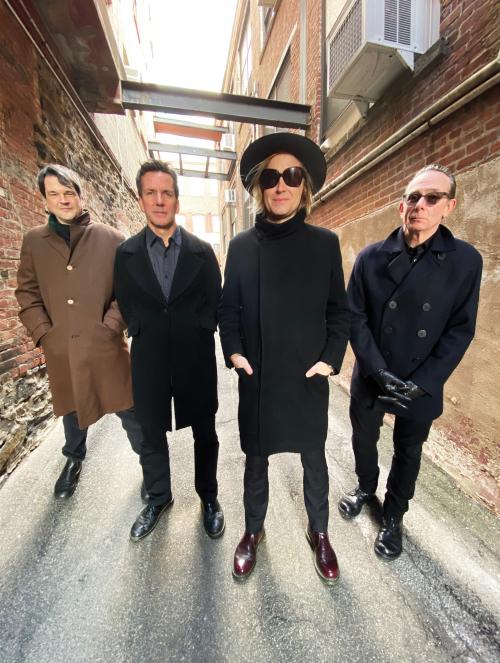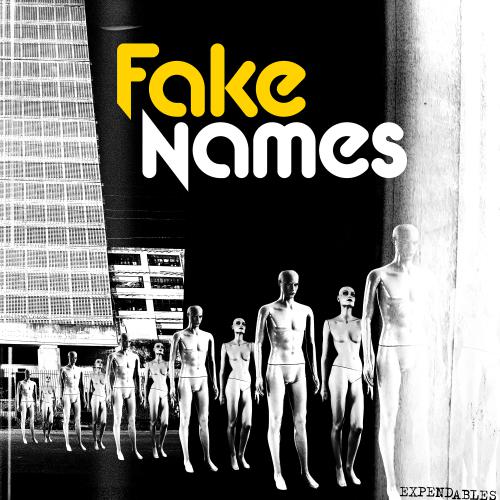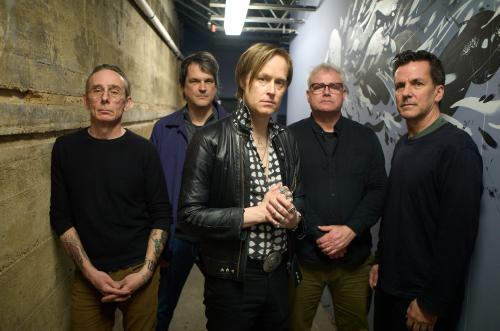Band: Fake Names
Album: Expendables
VÖ: 03.03.2023
Label/Vertrieb: Epitaph / Indigo
Website: https://fakenamesofficial.com/If credibility were currency, Fake Names’ wealth would be off the charts. Composed of Brian Baker (Minor Threat, Bad Religion, Dag Nasty), Michael Hampton (S.O.A., Embrace), Dennis Lyxzén (Refused, INVSN, The [International] Noise Conspiracy), Johnny Temple (Girls Against Boys, Soulside) and the newest member Brendan Canty (Fugazi, Rites of Spring), the band is a veritable post-hardcore dream team. However instead of rehashing the past, Expendables is a reinvention that sees the band dialing back the distortion and leaning into the melodies. The result pairs their unparalleled pedigree with a pop sensibility that’s slightly unexpected and wholly satisfying. “On our last record [2019’s Fake Names] the general influences were 70’s U.K. punk and power-pop; but it wound up with a little classic rock vibe as well, like the Vibrators meets Aerosmith. We never saw that coming!” Baker explains. “The pop influences are a little more out front on this one and the production really helps it shine. It sounds more direct, more urgent.”
While the band’s debut album was actually a demo that Epitaph founder and Baker’s Bad Religion bandmate Brett Gurewitz wanted to release as is, for Expendables the band enlisted producer Adam “Atom” Greenspan (IDLES, Yeah Yeah Yeahs). “On the new record the guitar tones are pretty clean, which is not what we normally do, but we’re old enough to know to give Atom’s ideas a shot because that’s the whole point of bringing someone in,” Baker explains. “Atom had me play through amps and pedals way out of my comfort zone, but the sounds he built were perfect for the songs.” That sense of curiosity is a major thematic component of Expendables, from the chiming harmonies of “Go” to the moody melodicism of “Madtown” (the latter of which could have just as easily been written in 1982 as it could in 2022). There’s also an economy to these songs that’s rooted in the fact that they were recorded in the span of a week, which eliminated the option to add superfluous instrumentation or arrangements. The result is an album that retains the members’ purity of vision in a strikingly refreshing way.
The ten-track album opens with “Targets,” a driving post-rock song that features jigsawing guitars and a massive chorus. “In general, Dennis writes about revolution, and Michael and I write pop songs. I’m amazed at how it works, but somehow it strikes the right balance of salty and sweet. With ‘Targets,’ however, the music sounds like the lyrics: that grinding riff, the pocket, the tempo are all in concert with the words.”
This imagery is paralleled in the artwork for Expendables, which Baker describes as ‘70’s dystopian’ and features an eerie army of mannequins set against a cold urban backdrop. That dichotomy of lively music and bleak imagery is an important thematic element of Expendables because the album is more than just a collection of catchy songs: it’s an artistic statement about our own impermanence.
That said, if the world is going down in flames, Fake Names are doing it in style—and that is exemplified with the title track, which wouldn’t sound out of place on Dischord’s classic catalog if it weren’t for it’s modern production and Bad Religion-esque backing vocals. “That song has so much classic Michael Hampton in it that I just laugh every time I play it,” Baker says. “It’s just so hooky and it’s got this soaring chorus that still excites me now and I’ve heard it, like, 175 times.” That mutual admiration between Baker and Hampton truly lies at the core of the musicality of Fake Names. Whether it’s the sixties-garage rock vibe of “Delete Myself” or satisfying syncopation of the album closer “Too Little Too Late,” Expendables is the latest exchange in a musical conversation that spans four decades. (In case you were wondering, Baker’s favorite Dischord release is Embrace’s 1987 self-titled album.) Baker aptly refers to the lineup of Fake Names as a “mutual admiration society” and says that once the five members got in the same room together, it felt as if they had already been in the band together for years.
“It was so comfortable because even though I hadn’t played with Brendan before, I could kind of figure out where he’s going to go just by understanding how he plays drums and listening to him so much,” Baker summarizes when asked about the current lineup of Fake Names. “There’s this intangible energy, a clairvoyance that comes from our shared experience.” That spark and this album could only be created by these five people at this exact moment in time, so listen to it loudly and listen to it while you can… because, ultimately, we’re all expendable.
++++++++++++++++++
Band: Fake Names
Album: s/t
VÖ: 08.05.2020
Label/Vertrieb: Epitaph / Indigo
Website: https://fakenamesofficial.com/
In early 2016, D.C. punk legends Brian Baker (Minor Threat, Dag Nasty, Bad Religion) and Michael Hampton (S.O.A., Embrace, One Last Wish) met up at Hampton’s Brooklyn home to play music together, with no intentions beyond possibly writing a song or two. Friends since first grade, the two guitarists ended up writing a handful of songs that day, then closed out the session with a spur-of-the-moment decision to start a band. When it came to finding a bassist, Baker and Hampton looked to Johnny Temple of Girls Against Boys and Soulside (another fellow student at their elementary school), who equally shared their passion for what Temple refers to as “loud, angry, visceral music.” By the end of the year, the band had enlisted Refused frontman Dennis Lyxzén as their singer, thus cementing the lineup to punk-rock supergroup Fake Names.
On their self-titled debut, Fake Names bring their collective history to a 28-minute burst of unbridled energy. Co-produced by Hampton and Geoff Sanoff and recorded at Renegade Studios (a New York City facility owned by Little Steven Van Zandt), the album augments their bare-bones breed of punk with a heavy dose of power-pop, cleanly manifested in the band’s bittersweet melodies and abundant backup harmonies.
At the heart of Fake Names is the singular kinship between Baker and Hampton, ineffably informed by sharing stages in their respective bands during the genesis of American hardcore music. “This feels like years of buildup to two phenomenal guitarists finally playing in a real band together,” says Temple. “It’s two lead guitar players who really know how to work together, with such an incredibly fluid meshing of their individual styles, and there’s never a moment where they’re competing over who’s playing the catchiest riff. I’ve never seen a hint of anything like that before.”
While Temple emerged from the same culture-shaping scene as Baker and Hampton, Lyxzén hails from an entirely different musical universe, having co-founded Refused in the Swedish city of Umeå. But when Refused, Girls Against Boys, and Bad Religion shared the bill at Riot Fest Chicago in 2016, both Baker and Temple were struck with the sudden inspiration to recruit Lyxzén as their singer—an offer he happily accepted. “I’m a huge record collector, and I’ve been hoarding all of their records for years,” notes Lyxzén, who names Minor Threat and Embrace among his favorite bands.
Once he’d returned to Sweden, Lyxzén began writing and recording vocals for the demos that Hampton had sent him, adding an element of lyrical invective that instantly gelled with his bandmates’ sensibilities. “We all have long histories of playing in bands where the singer is critiquing mainstream society and corporate society, and Dennis definitely didn’t shy away from that kind of critique,” Temple points out. And when Lyxzén headed back to the U.S. for a series of practice sessions, the band felt an automatic musical chemistry. “Dennis fit right in with us,” says Baker. “He’s a great singer and his ears were tuned to the kind of music all our bands were making back in the ’80s, so he knew exactly what to do. All of it made sense of immediately.”
Soon after dubbing themselves Fake Names—a moniker that’s part Raising Arizona reference, part recognition of the “ubiquitous and demonic use of the term ‘fake news,’” according to Baker—the band headed to Renegade Studios with the goal of creating a demo to present to record labels. But after playing those recordings for Baker’s Bad Religion bandmate Brett Gurewitz, the Epitaph founder made an unexpected proposal. “Brett said to us, ‘This isn’t a demo, this is the album,’” Baker recalls. “He was pretty adamant about putting it out exactly as it was, so that’s what we wound up doing.”
Built on performances both restlessly kinetic and unfailingly precise, Fake Names kicks off with the glorious fury of “All for Sale”—a lament against the toxic effects of capitalism. “It’s a song about how everyone’s owned by the banks and owned by the corporations,” says Lyxzén. “We’re slaves to debt and to our jobs, and we’re brainwashed to believe this is the only system that works.” On the frenetic and fast-paced “Brick,” Fake Names deliver a classic punk anthem complete with chant-along chorus and revolution-minded lyrics encapsulated by Lyxzén as “taking down the names of the people and institutions that have done you wrong.” And on “First Everlasting,” the album shifts into a brighter mood and bouncier tempo, even as Lyxzén examines some emotionally weighty subject matter. “It’s a more existential song, about taking a look at yourself and accepting the role you’ve played in your own life,” he says. “It’s about growing up and moving forward, and learning from past mistakes and failures.”
Although Fake Names deliberately avoided imposing any particular vision on the album’s creation, they did establish one rule for their writing sessions. “We didn’t want to do anything that we couldn’t reproduce live, which meant no pedals on any of the guitars,” says Baker. “It’s a lot less forgiving when you’re playing a very clean, dry guitar like that—the mistakes show way more clearly—but it was a fun challenge to go in that direction with the kind of music that could easily be very effect-heavy.” Recorded to tape, Fake Names ultimately unfolds as a welcome contrast to the more prevalent sonic aesthetic of the moment. “In the last 10 years I’ve seen all these bands with walls of pedals, even if they’re not playing anything atmospheric, and it sounds so processed but not in a powerful way,” says Hampton. “We wanted to see what we could come up with by going back to how we did it in high school, where basically all you’ve got is a guitar and an amplifier.”
Throughout their debut album, Fake Names radiate the pure joy in reclaiming a certain simplicity in the creative process. “When you’re younger and in a band, you feel really strongly about getting your opinions across, and sometimes you fight with your bandmates just because you feel like fighting,” says Hampton. “But there’s been none of that with this band—no one’s precious about anything, and it’s been so easy to work together.” Echoing that sentiment, Lyxzén points to the lack of calculation that’s defined the band since the very beginning. “A lot of times with bands there’s an agenda, and people often have very different ideas on what you need to do to succeed,” he says. “But with this band there’s no agenda at all: it’s a project completely driven by lust for the music, and the simple fact that we just truly love playing together.”




